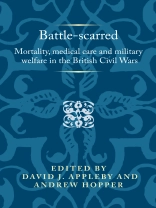Battle-scarred investigates the human costs of the British Civil Wars. Through a series of varied case studies it examines the wartime experience of disease, burial, surgery and wounds, medicine, hospitals, trauma, military welfare, widowhood, desertion, imprisonment and charity. The percentage population loss in these conflicts was far higher than that of the two World Wars, which renders the Civil Wars arguably the most unsettling experience the British people have ever undergone. The volume explores its themes from new angles, demonstrating how military history can broaden its perspective and reach out to new audiences.
Tabela de Conteúdo
Introduction
David J. Appleby and Andrew Hopper
Part I: Mortality
1 Battlefields, burials and the English Civil Wars
Ian Atherton
2 Controlling disease in a civil-war garrison town: military discipline or civic duty? The surviving evidence for Newark upon Trent, 1642–46
Stuart B. Jennings
Part II: Medical care
3 A new kind of surgery for a new kind of war: gunshot wounds and their treatment in the British Civil Wars
Stephen M. Rutherford
4 ‘Stout Skippon hath a wound’: the medical treatment of Parliament’s infantry commander following the battle of Naseby
Ismini Pells
5 ‘Dead hogges, dogges, cats and well flayed carryon horses’: royalist hospital provision during the First Civil War
Eric Gruber von Arni
6 Gerard’s Herball and the treatment of war-wounds and contagion during the English Civil War
Richard Jones
Part III: The hidden human costs
7 The third army: wandering soldiers and the negotiation of parliamentary authority, 1642–51
David J. Appleby
8 ‘The deep staines these Wars will leave behind’: psychological wounds and curative methods in the English Civil Wars
Erin Peters
9 The administration of military welfare in Kent, 1642–79
Hannah Worthen
10 ‘To condole with me on the Commonwealth’s loss’: the widows and orphans of Parliament’s military commanders
Andrew Hopper
11 ‘So necessarie and charitable a worke’: welfare, identity and Scottish prisoners of war in England, 1650–55
Chris R. Langley
Conclusion
David J. Appleby and Andrew Hopper
Index
Sobre o autor
Andrew Hopper is Lecturer in History in the Centre for English Local History at the University of Leicester












